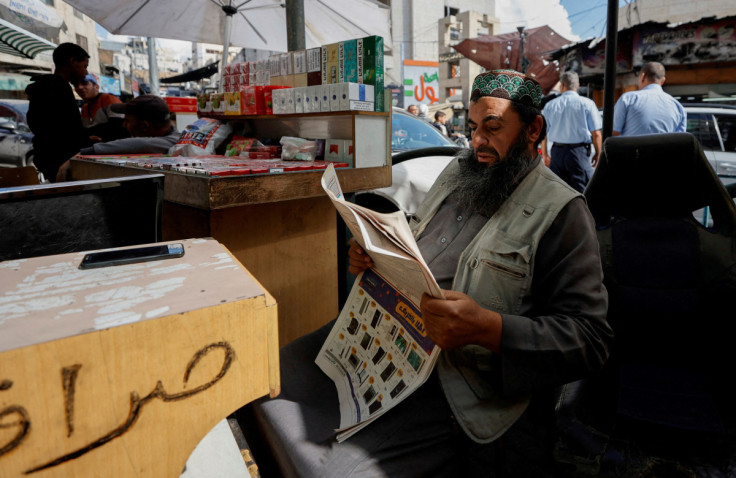Arabs View Revived Netanyahu With Concern But As Balance Against Iran

Benjamin Netanyahu's likely return to power will fuel concern about deepening tensions with Arab neighbours, but Gulf states which forged ties with Israel under his leadership will see him as a regional balance against Iranian power.
Arab leaders were largely silent on Wednesday over Netanyahu's triumph in Israel's election. Lebanon's caretaker prime minister predicted a new maritime border deal would hold, while Palestinians and Jordanian experts forecast new strains.
In the Gulf, where Arab concern over Iran's regional power dominates security strategy, Netanyahu's record of hardline opposition to the Shi'ite Muslim-dominated Islamic Republic has helped forge ties with Sunni Muslim Arab leaders.
It was under Netanyahu's government that Israel normalised relations in 2020 with the United Arab Emirates and Bahrain, and Morocco a few months later.
Abdulkhaleq Abdulla, a prominent Emirati political analyst, said for Gulf states like the UAE, Iran is a main concern and Israel, no matter which government, has always taken a strong line against Iran and its nuclear deal with global powers.
"Netanyahu was part of the Abraham Accords and signed it so there is no change in the course of normalisation," he said.
"People here (in the Gulf) will consider this as Israeli politics and Israeli internal issues that we have nothing to do with and we are happy to deal with whomever the Israeli people choose as their leader."
Abdulla said the victory of what he described as the "worst of the worst in Israeli politics" would have an impact mainly on Palestinians and kill any talk of a two-state solution.
Regional power Saudi Arabia, home to Islam's holiest sites, has yet to normalise relations although it has taken some steps towards rapprochement.
Saudi academic Aziz Alghashian said further moves by Riyadh should not be expected.
"In order for there to be any significant changes ...a process of peace between Palestinians and Israelis should be present - this is now unlikely with the new government," Alghashian said.
LEBANON DEAL
With Lebanon, Netanyahu has threatened to "neutralise" the maritime deal brokered by the United States while Lebanon still considers itself at war with Israel, although Beirut says it was assured by Washington that the deal would not be torpedoed.
"We're not afraid of a change in the authorities in Israel. Whether Netanyahu wins or someone else, no one can stand in the way of this (deal)," Lebanon's caretaker prime minister Najib Mikati told Reuters by phone.
He said U.S. guarantees would protect a maritime border deal with Israel despite opposition from Netanyahu, who has said it could benefit the militant group Hezbollah which has fought Israel.
"Israel cannot go too far against U.S. wishes because it needs U.S. protection, and therefore it is unlikely that a Netanyahu-led government will tear up the U.S.-brokered maritime border agreement... despite Netanyahu's strong rhetoric," said Lina Khatib at London's Chatham House.
PALESTINIANS, JORDAN
Leaders at a summit in Algiers glossed over their own divisions over relations with Israel and repeated their support for a Palestinian state - something Netanyahu has steadfastly opposed - but made no reference to the election.
Netanyahu, whose policies towards Palestinians have angered many in the Arab world since he first came to power 26 years ago, pledged that a government under his leadership would act responsibly, avoid "unnecessary adventures" and "expand the circle of peace."
But in Jordan, home to millions of Palestinian refugees and their families, his expected triumph was met with concern.
Relations between the two countries deteriorated under Netanyahu's last premiership to the extent that King Abdullah terminated part of their 1994 peace deal which allowed Israel the use of two areas of land along their border.
"Israeli policy under Netanyahu was confrontational with Jordan's official policy," said Hamad Faraneh, a former deputy in Jordan's parliament - where a majority of deputies called on the government in April to revoke the peace treaty.
"Jordan is worried more tensions and violence in Palestine would push more displacement and immigration of Palestinians to the kingdom," Faraneh said.
Jordan's Islamist opposition urged Arab countries to take a robust stance.
"Today the Israeli right is talking about expelling Palestinians, they are saying there is no (Palestinian) state ..so what is left for Arabs?" said Murad Adailah, secretary-general of Jordan's Islamic Action Front.
"What's required of these Arab countries is to depend on their people... and support the resistance of the Palestinians."
Egypt, the first Arab country to sign a peace deal with Israel and a mediator during Israeli-Palestinian conflicts, was likely to find a way to work with Netanyahu again, said HA Hellyer, non-resident fellow at the Carnegie Endowment for International Peace.
Netanyahu "has been terrible for even the semblance of a peace process which Egypt officially upholds," he said. "But they have dealt with him and they will deal with him again."
© Copyright Thomson Reuters 2025. All rights reserved.





















